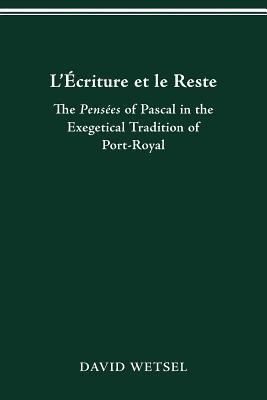
- We will send in 10–14 business days.
- Author: David Wetsel
- Publisher: Ohio State University Press
- ISBN-10: 0814253598
- ISBN-13: 9780814253595
- Format: 15.2 x 22.9 x 1.5 cm, softcover
- Language: English
- SAVE -10% with code: EXTRA
Reviews
Description
Modern critical approaches to the Pensées have often been profoundly influenced by the idea that these notes for Pascal's projected Apology for Christianity may be divided into two categories: the "pensées philosophiques" and the "pensées religieuses." This distinction has obscured the apologetic character of the proposed Apology by inviting critics to elucidate its purely "philosophical" meaning, and it has contributed to critical neglect of those passages that are deemed of only "theological" interest. To point up the true significance of these passages, Dr. Wetsel undertakes a systematic examination of the part played by the Bible in Pascal's overall argument. He does so from the perspective of biblical exegesis as practiced by the theologians of Port-Royal, and finds of particular value in illuminating previously enigmatic passages of the Pensées that extensive set of commentaries appended to his translation of the Bible by Issac Le Maistre de Sacy, Port-Royal's chief authority on the interpretation of Scripture and Pascal's own confessor. In Sacy's Préface à la Genèse, Wetsel has discovered a previously undetected key to Pascal's whole apologetic strategy. Wetsel establishes a series of parallel texts drawn from the thirty-four volumes of commentary assembled by Sacy. He enables interpretation of ideas that appear in the Pensées only in abbreviated and recondite form, reveals the larger dimensions of an apology based on the argument that God has built into the very fabric of sacred history a convincing proof of Christianity, and illuminates our heretofore imperfect understanding of the cryptic exchange between Pascal's libertin and the apologist himself that comes at the end of the argument known as le pari: "N'y a-t-il point moyen de voir le dessous du jeu?" "Oui, l'Ecriture et le reste." David Wetsel is an Andrew Mellon Fellow in the Department of French and Italian at the University of Pittsburgh.
EXTRA 10 % discount with code: EXTRA
The promotion ends in 18d.17:52:58
The discount code is valid when purchasing from 10 €. Discounts do not stack.
- Author: David Wetsel
- Publisher: Ohio State University Press
- ISBN-10: 0814253598
- ISBN-13: 9780814253595
- Format: 15.2 x 22.9 x 1.5 cm, softcover
- Language: English English
Modern critical approaches to the Pensées have often been profoundly influenced by the idea that these notes for Pascal's projected Apology for Christianity may be divided into two categories: the "pensées philosophiques" and the "pensées religieuses." This distinction has obscured the apologetic character of the proposed Apology by inviting critics to elucidate its purely "philosophical" meaning, and it has contributed to critical neglect of those passages that are deemed of only "theological" interest. To point up the true significance of these passages, Dr. Wetsel undertakes a systematic examination of the part played by the Bible in Pascal's overall argument. He does so from the perspective of biblical exegesis as practiced by the theologians of Port-Royal, and finds of particular value in illuminating previously enigmatic passages of the Pensées that extensive set of commentaries appended to his translation of the Bible by Issac Le Maistre de Sacy, Port-Royal's chief authority on the interpretation of Scripture and Pascal's own confessor. In Sacy's Préface à la Genèse, Wetsel has discovered a previously undetected key to Pascal's whole apologetic strategy. Wetsel establishes a series of parallel texts drawn from the thirty-four volumes of commentary assembled by Sacy. He enables interpretation of ideas that appear in the Pensées only in abbreviated and recondite form, reveals the larger dimensions of an apology based on the argument that God has built into the very fabric of sacred history a convincing proof of Christianity, and illuminates our heretofore imperfect understanding of the cryptic exchange between Pascal's libertin and the apologist himself that comes at the end of the argument known as le pari: "N'y a-t-il point moyen de voir le dessous du jeu?" "Oui, l'Ecriture et le reste." David Wetsel is an Andrew Mellon Fellow in the Department of French and Italian at the University of Pittsburgh.


Reviews